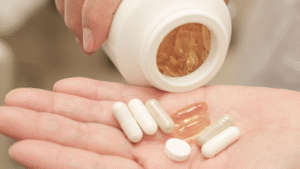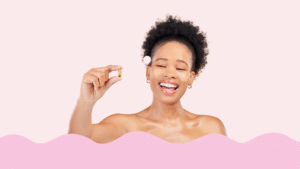Table of Contents
Finding Hope When Hormonal Acne Won’t Go Away
If you’ve struggled with persistent hormonal acne, you know how exhausting it can be. Many women try countless creams, restrictive diets, and dermatologist visits only to see their breakouts return. For some, hormonal imbalances play a major role in why acne persists well into adulthood.
One young woman shared her story of battling acne from her teen years into her twenties, trying everything from dietary changes to zinc supplements, but nothing fully worked. This story resonates with countless women who have tried everything only to feel let down again.
The good news is that science does give us some insight into what can help. While there’s no single cure that works for everyone, there are approaches supported by research that can make a difference.
Why Hormonal Acne Happens
Hormonal acne often appears around the chin and jawline. It’s linked to fluctuations in hormones like androgens, which increase oil production in the skin. These fluctuations can occur due to menstrual cycles, conditions like polycystic ovary syndrome (PCOS), or other hormonal imbalances.
A retrospective analysis of more than 2,000 patients found that hormonal contraceptives are sometimes prescribed because they reduce androgen activity, which can improve acne (Lucky et al., 2004). However, not every woman is comfortable with this option due to side effects or personal reasons.
Hormonal Acne Solutions For Other Women
Many women who struggle for years find that a multi-faceted approach works best. In discussions online, some women shared that nothing helped until they addressed their hormones with the help of a doctor or endocrinologist. Others found that certain skincare routines only worked temporarily.
A review of treatments for adult female acne notes that prescription medications like spironolactone or hormonal contraceptives are often considered effective (Shaw, 2005). However, these should only be taken under medical supervision.
Where Supplements Fit In
While supplements aren’t a cure, some nutrients have been studied for skin health. For example, zinc plays a role in inflammation and wound healing, though results vary when it comes to acne improvement (Sharquie et al., 2008). Omega-3 fatty acids may also support skin barrier function and reduce inflammation.
If you decide to explore supplements, look for high-quality options. A balanced zinc supplement or omega-3 fish oil can be a helpful addition to a healthy diet. These can be purchased through trusted affiliate links, and it’s best to discuss any new supplement with your healthcare provider first.
Seeking the Right Professional Support
One recurring theme is that seeing multiple dermatologists without results can be discouraging. But sometimes the best step is seeing a general practitioner or endocrinologist who can evaluate for hormonal disorders.
Conditions like PCOS, thyroid imbalance, or insulin resistance can contribute to acne. Identifying and treating the root cause is often more effective than just trying new skincare products.
According to a clinical review, hormonal therapies can provide significant relief for many women, but treatment must be individualized (Shaw, 2005). If you’ve felt dismissed or misunderstood, finding a provider who listens and is willing to work with you on a plan is key.
Read: Zinc for Hormonal Acne
Caring for Your Skin Without Harsh Overload
Overusing strong creams can backfire, leading to irritation and more breakouts. Many dermatologists recommend starting slowly with any new topical treatments. Supporting your skin barrier with gentle cleansers and moisturizers can help your skin tolerate treatments better over time.
A Word From Vitamins For Woman
Persistent hormonal acne can feel overwhelming, but you are not alone. Many women need both lifestyle support and medical guidance to find real solutions. While no supplement or cream will work for everyone, a combination of proper nutrition, gentle skincare, and professional guidance can make a meaningful difference.
Your journey to clearer skin might take time, but with the right support, progress is possible. Healing your skin is not just about appearance, it’s about feeling confident and at ease in your own body.
Lucky, A. W., Henderson, T. A., Olson, W. H., Robisch, D. M., Lebwohl, M., & Swinyer, L. J. (2004). Hormonal contraceptives and acne: a retrospective analysis of 2147 patients. Journal of the American Academy of Dermatology, 50(3), 385-392.
Shaw, J. C. (2005). Hormonal therapy in adult female acne: A practical guide. Journal of the American Academy of Dermatology, 53(6), 973-984.
Sharquie, K. E., Noaimi, A. A., & Al-Salih, M. M. (2008). Oral zinc sulphate in the treatment of acne vulgaris: A double-blind study. International Journal of Dermatology, 47(5), 498-503. https://pubmed.ncbi.nlm.nih.gov/19082228/












